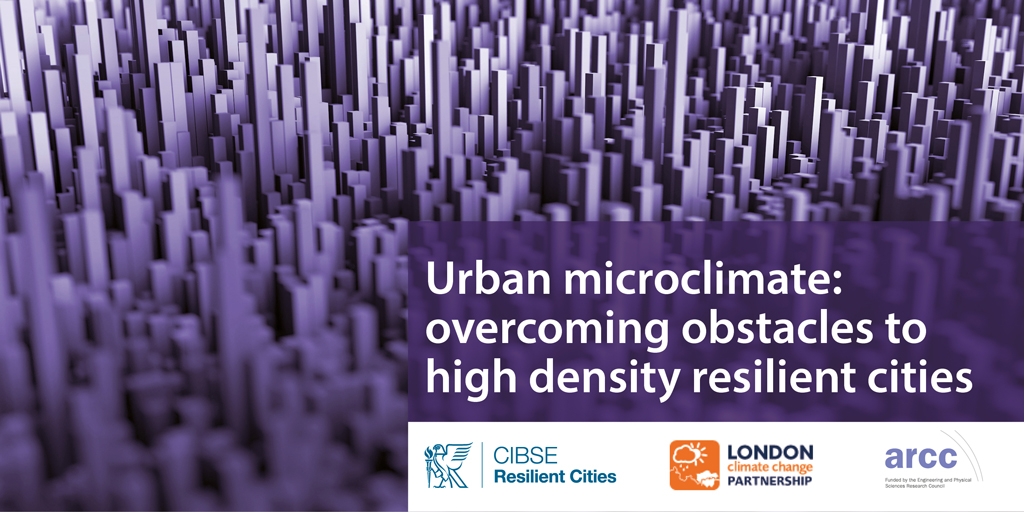Highlights from ARCC – 2017 Annual report
Throughout 2017, the ARCC network has continued to work with researchers and stakeholders to enhance the impact of evidence from research to support resilient and sustainable buildings and infrastructure in the UK. By focussing on current policy and practice requirements, the network has facilitated knowledge exchange between a wide range of academics and stakeholders to better inform decisions at the local, regional and national level.
Meeting evidence requirements
- Science – policy/practice dialogues are longer-term initiatives aimed at stimulating the broader understanding of scientific evidence and its implications for policymakers and practitioners.
- Infrastructure interdependencies. A key focus this year has been working with the Environment Agency’s Infrastructure Operators Adaptation Forum (IOAF) to explore approaches to addressing infrastructure interdependencies. With Forum members, a matrix-based tool has been developed to provide a practical means of identifying and mapping interdependencies and of capturing supporting evidence. Through dialogues with infrastructure operators, work continues to explore the utility of this approach.
- Improving indoor air quality. With the Royal College of Physicians, the Royal College of Paediatrics and Child Health and the Building Research Establishment, our Better homes, better air, better health event was the first stage of a multi-partnered discussion to engage the built environment and medical communities in how to improve indoor air quality. The workshop looked to encourage over 60 industry and research leaders to think about solutions to reducing exposure to air pollution when indoors.
- Synthesis reports focus on specific cross-cutting topics for targeted audiences. They summarise research outputs and their implications from across projects to raise awareness of the latest research findings.
- Ageing and mobility in the built environment. Our ageing population has specific implications for delivering a sustainable urban environment. Evidence from a suite of six research projects looking at the planning, design, and management of housing, neighbourhoods and public spaces, and how they can be improved to support the wellbeing of older people has been synthesised. Cross-cutting messages are highlighted together with possible response strategies to help inform a range of decision-makers.
- Flooding & business: what does research tell us? Flooding represents a range of threats to businesses. To help raise awareness and enhance the accessibility of evidence and knowledge from relevant research, the ARCC network is mapping current UK research with the aim of providing a comprehensive evidence base to help inform the very diverse stakeholder community in this area. This builds on initial engagement to identify research gaps and evidence needs from business.
- Theme-focused initiatives look to stimulate cross-project synergies on specific themes of importance to policy and practice, and to initiate and strengthen links with stakeholders.
- Heritage buildings: the impacts of damp & moisture. As our climate changes, the effects of damp and moisture on heritage buildings are becoming increasingly important. Working with CADW, the Welsh Government’s historic environment service, the network brought together heritage building professionals and researchers to explore the latest evidence on whether changing rainfall patterns are pushing historic building materials and methods beyond their ability to cope. Innovative approaches to the non-intrusive mapping of moisture penetration in the fabric of buildings that are being developed by researchers were also demonstrated to help inform the discussions on potential solutions.
- Urban microclimates: overcoming obstacles to high density resilient cities. Working with the CIBSE Resilient Cities Group, 65 policy, industry and academic experts shared scientific knowledge and to stimulate thinking towards the development of high-density, resilient and sustainable cities. Researchers and practitioners debated the current understanding of the relationships between high density urban typologies, urban climate, energy management, the use of green infrastructure and the health and well-being of urban dwellers. Gaps in knowledge were identified as were strategies for taking research forward.
- Promoting co-production of outputs by enabling joint working between researchers and stakeholders that is directed at enhancing the usability and application of research. The work also builds skills and capacity in both delivering and using evidence from research.
- Enhancing the uptake of built environment models, tools and data. Difficulties in the accessibility and readiness of research outputs for integration by policy and practice can sometimes limit their value. The network were successful in securing an EPSRC Impact Acceleration Award (£20k, Jan 2016-Mar 2017), to fund a research secondment looking at how to enhance the uptake, use and utility of models, tools and data in the built environment. Guidance and recommendations have been developed to help facilitate the provision and uptake of research outputs to enhance their practical use and application.
- Joint working opportunities. The last of six projects funded by the ARCC network through this scheme (total funding of £50k) is now complete. Researchers at UCL collaborated with the London Borough of Hounslow to better understand the combined effects of housing, the urban heat island and population age on heat-related mortality, and options for mitigating this risk. A prototype tool has been developed to help evaluate local health risks and to identify those locations with elevated heat risk.
Strengthening knowledge exchange
- Showcasing research has emerged as a strong theme in the ARCC programme over the final 18 months. Opportunities have been identified with leading industry events, relationships built, and research taken directly to industry. This has been a major component of the ARCC network, so much so that a bespoke ECR event was developed to support this theme (see Training research leaders of the future below):
- We continued our work with UK Construction Week; building on 2016 as exhibitors to 2017 with ARCC advising on seminar content, and identifying and coordinating researcher presentations in the programme (four presentations were coordinated but due to unforeseen circumstances, only one was able to present at the event, with positive feedback received). This big industry event had 33k visitors through the doors in 2017.
- Working with research groups from seven universities, the network stand at Ecobuild 2017 demonstrated the latest discoveries in Future materials and processes to a potential audience of 25,000 professionals. The showcasing opportunities went beyond the physical attendance at the event, with project profiling on social media (particularly Twitter) reaching audiences in the 1000’s. Researchers were also interviewed for the EcobuildTV; online TV channel. A UCL researcher provided insight into the value of being involved in showcasing their research: A researcher’s experience of Ecobuild 2017. The ARCC network was sought out by event managers to work on a larger research feature for Ecobuild 2018, with a research call launched in 2017 under themes of ‘robotics’ and ‘inspired by nature’.
- Similarly, the latest research contributing to Heathy homes and novel building materials from five universities was showcased in the Research Zone @ The International Refurbishment Symposium to delegates focussing on sustainability in the domestic sector.
- For the second year running, we partnered with the Chartered Institution of Building Services Engineers (CIBSE) to coordinate a design challenge on the use of Green infrastructure as a building service in office buildings as part of Green Sky Thinking Week.
- Enhancing the value of adaptation reporting. The Climate Change Act 2008 gives government the power to direct organisations responsible for essential services to report on their progress in adapting to climate change: the Adaptation Reporting Power (ARP). The second round of reporting finished in 2016, with 59 reports submitted from 86 organisations, including water, electricity and gas companies, regulators, and road, rail and harbour authorities. Working with Defra and the Climate Change Committee Adaptation Sub-Committee to review the reports, The value of the ARP process to the reporting organisations involved was explored as a means of helping to ensure future reporting rounds provide greatest overall benefit.
- Communication and dissemination. A central knowledge exchange website remains the focus for up-to-date information on network activities and for on-going dissemination of existing outputs. Complemented by a monthly newsletter emailed to 1000 recipients (a wide range of researchers and stakeholders), a regular twitter feed with over 1000 followers and a LinkedIn page for the network, the overall aim has been to provide regular and timely information on network activities, external initiatives and funding opportunities. Invited blogs on subjects as diverse as Challenges for the urban research community and Buildings need sustainable operations too have contributed to this integrated approach to dissemination.
Developing the community
- Training for the research leaders of the future. Our successful series of knowledge exchange skills development events continued in 2017 bringing together early career researchers in the built environment and infrastructure sectors. These events have enhanced professional skills of young researchers and have helped to develop expertise in maximising the impact of research. Workshops on Effective stakeholder engagement and a new programme Showcasing research to promote impact were delivered to over 40 early career researchers from 18 different universities with participants developing strategies for engagement and communication initiatives for use in their own research.
- Expert contributions to broaden understanding and engagement. Working at the boundary between researchers and stakeholders gives the ARCC team a unique perspective on approaches to effective knowledge exchange. To share this expertise and to help stimulate such processes to enhance the benefit of research, the network actively contributes to, and learns from, a range of external initiatives:
- representation on proposal review panels (EPSRC Environmental Challenge Fellowships, UK-India Energy Demand Reduction Call, Engineering for a Prosperous Nation Call, Evaluation Panels on climate and energy in Sweden and Austria)
- membership of scientific advisory committees for research projects both in the UK (Research on changes of variability and environmental risk, Unintended consequences of decarbonising the built environment, Transforming energy through digital innovation, Models to decisions) and in Europe (Climate resilient cities and infrastructures, Impacts and risks from higher-end scenarios)
- input to the work of professional bodies (British Standards Institute climate change adaptation group, the London Climate Change Partnership and CIBSE’s Resilient Cities Group).
For the future
- The ARCC network finishes in April 2018. We are working to complete a number of remaining actions and are liaising with external organisations with a view of passing on leadership of on-going activities. After nearly a decade of working in the research coordination and knowledge exchange field, we hope to summarise lessons learnt from a communication and knowledge sharing perspective as a means of sharing good practice and experiences, and to help identify where added value from an overarching network could be achieved in future stakeholder-led research programmes.
- Roger Street, Principal Investigator
- Vicky Hayman, Knowledge exchange & coordination officer
- Phil Sivell, Adaptation science officer, infrastructure
- Briony Turner, Knowledge exchange manager
- Tanya Wilkins, Science communicator
- Stephanie Ferguson, Designer & editor





